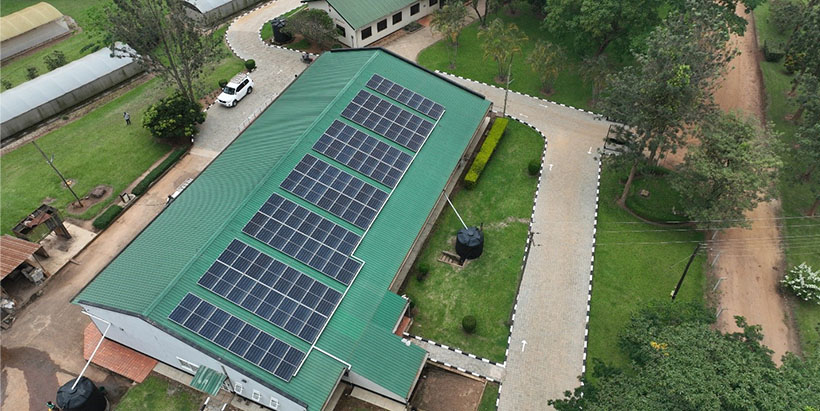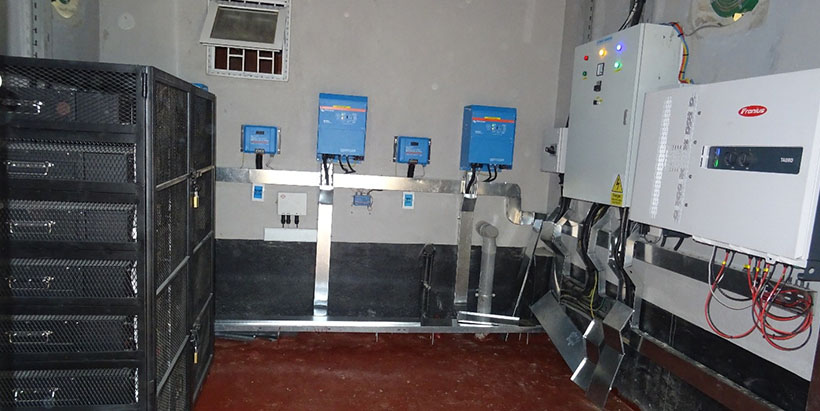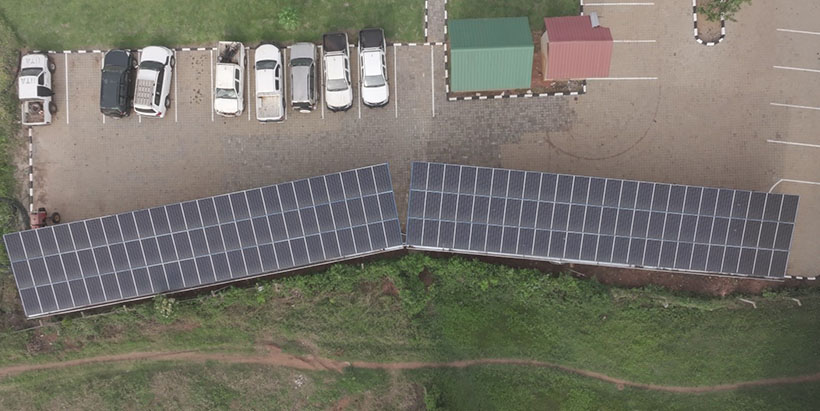Uganda has been one of the hubs for IITA‘s research and development efforts since 1992. The station, strategically located at the Sendusu farm in Namulonge, benefits from a subequatorial climate with 12 hours of daily sunlight.
In 2022, IITA’s Sendusu station launched an ambitious project to harness solar energy, installing a cutting-edge 45kW AC-coupled hybrid solar system designed to reduce dependence on the national grid while providing a reliable, eco-friendly energy solution. This innovative system has significantly reduced the station’s reliance on the national grid, resulting in significant cost savings while helping to lower its carbon footprint.
The system, composed of 88 high-efficiency solar panels, three Victron inverters, and 22 BYD lithium iron phosphate (LiFePO4) batteries, ensures consistent energy generation and storage. The integration of a standby generator ensures uninterrupted power during emergencies.
The system generates power from 45kW peak solar panels, which are distributed between the 50KVA grid-tie Fronius inverter (24kW) and four Victron charge controllers (22.5kW). The grid-tied Fronius inverter requires a constant AC signal, provided by three Victron hybrid inverters, to output its generated power and support the loads. The 22 kW solar panels connected to the 100/250A charge controllers charge the batteries directly, ensuring system operation even if the grid-tie inverter is down or faulty.
The system’s functionality is designed to prioritize power generation from solar panels, followed by battery power and grid power, which only comes in when solar generation is unavailable due to weather conditions and batteries are discharged up to 90%. The 22 batteries are connected in parallel across three DC distribution boards and are remotely monitored and reset using Victron appliances.
The system’s efficiency has eliminated the need for generator backup, and the powerhouse is equipped with factory-grade fans to ensure proper cooling. This setup reliably powers the entire station, particularly three laboratories that require a constant energy supply to operate critical equipment, including freezers, incubators, a freeze-drier, and growth rooms.
To further enhance our irrigation capabilities, a 20.6 kW solar panel system was installed at the parking lot as part of the Crop to End Hunger (CtEH) CGIAR initiative. This system powers the irrigation network spanning 25.9 hectares, leveraging renewable energy to guarantee a consistent water supply for our crops.
By tapping into solar energy, the Sendusu station creates optimal conditions for banana and cassava breeding, driving progress in our research and development efforts.
Energy generation and impact
Between December 2023 and December 2024, the system generated 27,813 kWh of solar energy, reducing grid energy consumption by 24,875 kWh. The station also fed 5,539 kWh of excess energy back into the grid.
Based on the national grid tariff of $0.21 per kWh, the station generated $5,840.73 worth of solar energy and fed $1,163.19 worth of excess energy back into the grid annually. The total annual value of solar energy generated for 2024 amounts to $7,003.92, with a monthly value of $583.66.
This green energy initiative has proven to be a game-changer, providing a sustainable, reliable, and environmentally friendly source of power that reduces carbon emissions, mitigates climate change, and lowers our carbon footprint, thus contributing to a cleaner environment.
By harnessing solar energy, IITA Uganda’s Sendusu Station has set a shining example of sustainability and innovation. It has reduced its carbon footprint while driving progress in agricultural research and development and paving the way for a greener future for future generations.
Contributed by Moureen Awori, George Mahuku, Rony Swennen, John Ochola and Brigitte Uwimana






No Comments